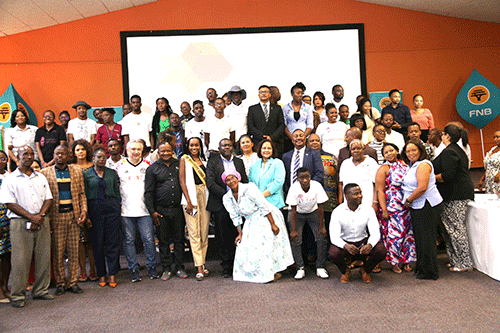THE convenor of World Non-Governmental Organisation Day, Ronny Dempers, says these institutions do not exist to acquire power or to make money but to uplift the societies they serve.
He said non-governmental organisation (NGO) vacancies are not third-world jobs that people take because they can’t get employed.
“If you are an NGO that is interested in power and making profit, you have graduated to another stage and should no longer be considered as one,” said Dempers on Wednesday during the celebration in Windhoek.
He added that such events are meant for individuals and organisations to get together, celebrate and reorganise.
“Because we are also faced with different challenges, or a moment such as this, it’s time to express our achievements, our challenges as a collective,” he stated.
He was equally concerned that some organisations just disappeared from the radar and wondered what was causing this.
“We want to say on this day to the world and to Namibia that we exist to make a difference. We want to qualify and quantify our contributions as a sector. We are also coming together on this day to recommit and redouble ourselves as a sector towards good governance,” Dempers said.
He further said, “We are also here to show that being in the sector is not a job for the third class and shouldn’t be the last drop off because you are unemployed”.
Dempers said it is a profession and it needs to grow, adding that it is capable of being seen as a career path.
“Some of us belong in the sector, and we need to create a conducive environment that attracts young people to be able to flow into the sector to make the sector most sustainable. But the current conditions of service are some of the things that we need to reflect on,” he pointed out. FNB’s account executive Bolle Hans said NGOs promote pluralism, diversity, and tolerance in society while protecting and strengthening cultural, religious, and other identities. “They stand out, thanks to their capacity to reach out to empower, represent, and defend vulnerable and socially excluded groups and trigger social innovation,” said Hans. He added that with an annual investment of over N$15 million in corporate social responsibility, the group remains committed to doing what matters throughout Namibia.
“The work of our NGO partners inspires us to be more than a bank, more than an investment house or advisors,” he said.
He indicated that NGOs are valuable and efficient implementers of human rights and development work, and this is due to their closeness and commitment to communities, a project that has impacted over one million Namibians.
United Nations Development Plan country representative Alka Bhatia said credit should be given to NGOs as they fill in gaps left by the government.
“What is needed here is collective action, collaboration, and commitment. In fact, all institutions must pull together and ensure that we focus on the future,” said Bhatia.
She noted that the late President Hage Geingob’s message on systems in institutions and processes must be kept alive.
“Our engagement ranges from engaging policymakers with building transferable skills among the youth in rural areas, sensitising the youth on environmental issues and promoting responsible citizenship representing a vital component in nurturing future environmental and development leaders,” she said. The executive director of the Institute of Public Policy Research (IPPR) Graham Hopwood said civil society might be small, but it is impactful and crucial in issues around the basic income grant, equal rights, and the red line among others. “However, funding remains a critical issue. Upper middle-income donors are prioritised and there is a lack of philanthropy and limited CSI,” he stated.
-psiririka@nepc.com.na


